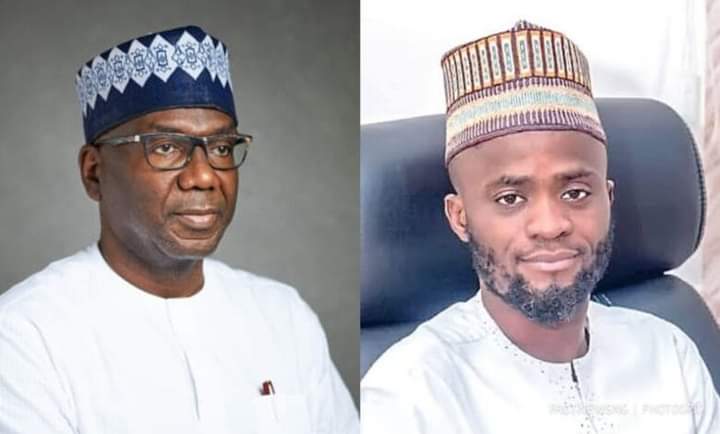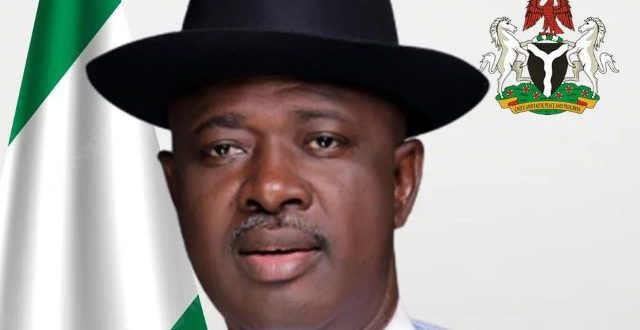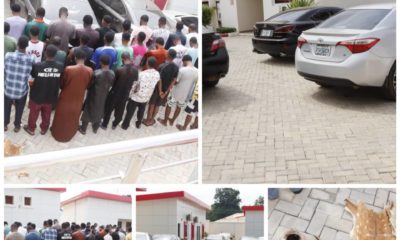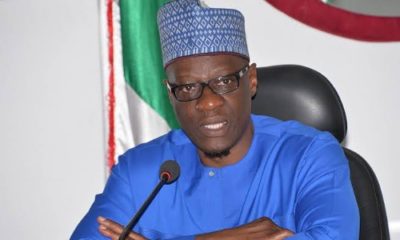Opinion/Feature
Mr Ajakaiye, The Storytelling Animal

By Dare Babatunde
In Animal farm by George Orwell, he narrated how animals rebelled against their farmer master, but the rebellion quickly failed and they returned to square one. Ajakaye is finding it uneasy to comprehend “O’Suwa”, because it is baffling that people can embrace such slogan within four years.
However, what is impossible in a democracy? Especially when people have come to understand that four years can make a significant difference in nation and state building efforts.
The administration of APC in the state is shocked to see the wave of opposition in Kwara state, they are yet to come to terms with the fact that people do not want to continue to service democracy based on empty promises.
The CPS to the Governor; Mallam Rafiu Ajakaye forgot one important thing before writing his long prose. Literature didn’t provide answers on physics and electricity generation nor did it get us to the moon. Science did. Governance is science not literature. This distinction is essential before quoting Chinua Achebe next time.
Whenever I see advocacy for Governor Abdulrahman Abdulrazaq to go for another term, I shake my head and get so curious how people make mockery of democracy with a bold face. It is not because the individual occupying Government House in our state lacks the basic educational requirements, but even his dull presence seems to rob people of their intelligence.
For instance, take a look at Rafiu Ajakaye who deliberately chose to ignore the crucial role of institutions in sustenance of government policies. We are speaking of government not intervention bodies which focus on one thing ignoring the other parts.
Who blames inflation on migration of victims of insecurity to Kwara State, if not Rafiu Ajakaye? Is that one of the factors that basic economics explains as the underlying factors for inflation? Don’t countries, states across the globe receive influx of people everyday and yet their economies remain solid.
Ibadan is an alternative place for people aiming to go to Lagos and thatvis why the largest city in West Africa is getting more and more populated day by day. Why is the city not in crisis or topping the list of states with inflation.
Agreed that inflation can affect the price of any commodity or service, but understanding and rolling out solutions is more crucial than playing the blame game. Needless to say unemployment, total dependence on funds from the centre, refusal to create a productive economy via food production and a host of others, are contributory factors. Also, the politicised Kwarapreneur/KWASSIP is just a mockery of what should be genuine efforts to boost human capacity development and create employment via SMEs in the state.
Ajakaye is a liar, he embraced fiction line by line, sentence by sentence, paragraph by paragraph. Perhaps, he is desperate to ensure people remain addicted to the propaganda of the government he represents. Such is the trait of a storytelling animal and if Kwarans are left to get glued to fantasy like MCU comics, Ajakaye will succeed in manipulating Kwarans.
This government pushed out a narrative that civil servants are applauding them, whereas 2018, 2019, 2020 and 2021 promotion letters given to TESCOM are yet to attract any cash backing. Also, go to Ilorin General Hospital, I have been there myself, their dentists would rather suggest to you to get the right treatment for your teeth outside than within the hospital. Ajakaye’s breath is a lie, he eats and sleeps with lies without any conscience or emotions for the good of the state.
Recently, President Muhammadu Buhari alleged that State Governments are stealing local government funds, all states were indicted including Kwata State. This further solidifies the suspicion of why AA’s government has reduced local government councils to political followership platforms and not a platform that can accelerate growth and developmental efforts in the state.
What APC does in the state is simple. They simply get a pig because the animal share similar skin with humans and practice their tattoos on the pigs before trying it on Kwarans.
There is vandalisation of structures, non-payment of salaries to police constabulary, FADAMA scheme has been stopped, and there is unprecedented inflation in the state. The people have seen undue extension of the renure of the retired clerk in direct contradiction to civil service rule, increased patient’s card fees in hospitals, poor performance by students from the state in regional and national exams, and Ajakaye is mocking the people for simply saying they are tired?
What of colleges of education staff salaries? Closure of the state asphalt plant, increased insecurity, collapse of Soludero buses and the degeneration of the state capital to a level where it is categorised as one of the dirtiest cities in Nigeria? IGR hasn’t increased beyond what previous government projected before exiting the scene, more troubling is that KWIRS staff were protesting to get the attention of government.
May I remind Ajakaye that his master, Governor Abdulrahman Abdulrazaq has not even constituted the security council for the state talk less of attempting to think about expansion or strengthening of existing measure for protection of lives and property? Has the administration worked to make abduction costlier for perpetrators? Can Ajakaye point to one single measure designed to contain this trend beyond his empty words?
Abdulrahman Abdulrazaq got over N8 billion in grants for health in the state, including equipment. Yet, people opted for private hospitals for medicare and not because they could afford it but based on recommendations from the hospital staff who often claim, rigthly so too, that they are short staffed. Is Ajakaye making mockery of people’s genuine pains in the state? Some Cottage hospitals have only one doctor without equipment. Yet statistics that contradict reality are being rolled out by the State Government.
The money Abdulrahman Abdulrazaq got in refund from illegal deductions from the two previous administrations in the state amount to over N15 billion. Also, Abdulfatai Ahmed left tax refund amounting to N5.2 biilion, along with the N1.8 billion credited to the state government for the transparency in 2018 budget executed by Abdulfatai Ahmed’s administration.
Also, over N8.2 billion was recently refunded for SURE-P, in total, everything amounts to over N50 billion, where is the direct impact of these money on Kwara State? Our people are no fools, even if a revisionist like Ajakaye wants to present them in that negative garb? Four months salaries owed to SUBEB and Local Governments staff during financial crisis in the country are yet to be offset by Abdulrahman Abdulrazaq.
Abdulrahman Abdulrazaq’s administration is responsible for half of the debt that the state has. This means in four years, he has borrowed more than the administrations of Governors Lawal, Bukola Saraki and Abdulfatai Ahmed which spent combined 20 years in office. Yet, no major project has been commissioned in the state.
Gbugbu proposed international market is not even up to the size of a market in Asa local government. Is the story telling animal unaware of this devaluation and debt profile details and the fact that the administration in which he serves has had without no direct impact on the citizens?
Governor Lawal owed salaries around 2003 prior to Bukola Saraki’s emergence as Governor. It was gathered that in Moro LG alone, 18 months outstanding salary was owed. In Ilorin East, staff were owed Ilorin nine months salary, and Dr. Bukola Saraki paid everything off within six months of assuming office without throwing tantrums or drumming around for applause.
In Ilorin today, everywhere is flooded with Abdulrahman Abdulrazaq campaign posters in which the prime achievement is boldly printed as the payment of salaries. Of course, this is a government of no projects, policies or any sustainable programme. Well the government has a fiction writer as a spokesperson. That may as well be an achievement.
Ajakaye decided to soak himself in Jonathan Gottschall book titled “The Storytelling Animal” where the idea of make-believe, and shaping narratives were experimented, especially for people who are aiming to make crucial decision about their state.
Unfortunately, Ajakaye and his principal are narrowing prosperity to “economic benefit” alone. This is the reason why they praise themselves for paying salaries and providing other basic amenities that are needed to fast track development.
No last minute posture of John Grisham or Hardley Chase can avert the imminent loss of the APC Government in Kwara State. If Ajakaye so wishes, he may decide to continue experimenting with the truth and interpreting “O’Suwa” in accordance with his understanding and limitations.
Someone who works with Abdulrahman Abdulrazaq wouldn’t know that he is yet to attain his potential when he is seen as the best within that environment. In an environment where mediocrity is the culture, Ajakaye’s limited understanding of governance and political intrigues shouldn’t be blamed for so long!
Opinion/Feature
Downstream Deregulation: Between Obasanjo’s Half-measures And Tinubu’s Bold Leadership

Opinion/Feature
UNCOMMON SCHOLAR, EXCEPTIONAL ADMINISTRATOR: MY TRIBUTE TO PROF. OLOYEDE AT 70

By President Bola Tinubu
As Professor Ishaq Oloyede turns 70 tomorrow, October 10, I pay a special tribute to this astute administrator, educator, author, and scholar, currently the Joint Admissions and Matriculation Board (JAMB) Registrar.
As the former Vice Chancellor of the University of Ilorin, Prof. Oloyede’s invaluable contributions to the nation through academia and public-sector administration have significantly impacted the academic community.
ALSO READ: Tinubu Congratulates Zainab Shinkafi-Bagudu On Her Election As President, UICC
His impactful tenure at the University of Ilorin, during which he introduced landmark ideas and innovations that helped the institution attain enviable heights, is on record.
Through patriotic dedication and commitment to his craft, Prof Oloyede imparted knowledge and character to thousands of students who underwent his teaching during his glorious and impactful academic career.
Indeed, the bedrock of development lies in education. Developing nations, including Nigeria, are in dire need of more scholars like Prof. Oloyede. His selfless sacrifices and innovative approaches to learning and leadership give hope for a brighter future.
Perhaps more remarkable is Prof. Oloyede’s transformative leadership at JAMB. He pioneered and sustained a series of reforms and technological innovations that have made the admission process in Nigeria transparent and credible.
In his eight years of stewardship at the board, thus far, Prof. Oloyede has demonstrated an uncommon commitment to financial integrity and accountability in public service. He has also raised the bar in administration and management.
I am proud of Prof. Oloyede’s accomplishments.
The nation owes the Professor of Islamic Jurisprudence a debt of gratitude for transforming JAMB, traditionally a non-revenue-generating government agency, into a consistent contributor to the national treasury through efficient financial management. His contributions to JAMB are invaluable and greatly appreciated.
On this occasion of his 70th birthday, I join members of the academic community, students, JAMB staff, and well-wishers in celebrating this scholar who, in words and deeds, has also done a lot to propagate the Islamic religion.
I pray that Almighty Allah will continue to honour the distinguished professor with health, wisdom and strength to serve the nation for many more years.
Opinion/Feature
Clarification On NNPCL Refinery Operations

By Sen. Heineken Lokpobiri PhD
My attention has been drawn to statements made by Engr. Kamoru Busari, Director of Upstream in the Ministry of Petroleum Resources, who represented me at a recent conference in Lagos. I wish to categorically state that the claim that I directed the Nigerian National Petroleum Company Limited (NNPCL) to stop running its own refineries and focus solely on equity participation in other refineries is false. This does not represent my position as Minister overseeing the oil sector, nor does it reflect the stance of the Federal Government.
It is important to clarify that NNPCL is a company governed under the Companies and Allied Matters Act (CAMA), with a functional board and management. The Ministry of Petroleum Resources does not control or run NNPCL, as it operates independently like any corporate entity.
ALSO READ: NNPC/Seplat JV’s “Eye Can See” Programme Restores Vision, Hope In Imo
The oil and gas sector is fully deregulated, and the Nigerian government remains committed to promoting in-country refining. We encourage companies, including NNPCL, to operate independently, following global best practices. While we provide strategic guidance, we do not interfere directly in the operations of these companies.
I reaffirm our commitment to supporting the growth and independence of NNPCL, ensuring that its operations are in line with international standards for efficiency and transparency and profitability.
Sen. Heineken Lokpobiri PhD, Minister of State Petroleum Resources (Oil), wrote from Abuja, Nigeria
















